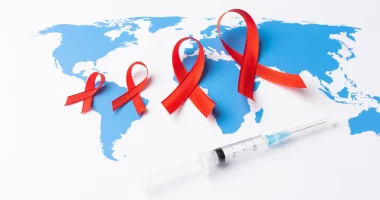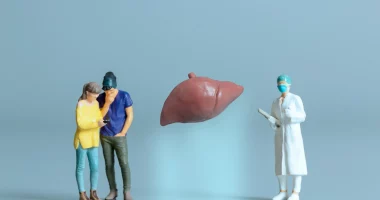Anorexia means losing your appetite and not being able to eat, because of a physical sickness. Anorexia nervosa, however, is a mental health condition where a person deliberately eats very little. This is a serious illness, but with proper treatment, people can recover. Anorexia nervosa is part of a group of mental health disorders that involve emotional difficulties, a distorted body image, and an intense scare of gaining weight.
Sometimes, a person might lose a lot of weight and show signs of anorexia but still have a normal body weight or BMI. This condition is known as atypical anorexia nervosa.
Anorexia nervosa usually starts in the teenage or early adulthood, but it may also begin before the teen years or later in life.
While many people think anorexia nervosa mostly affects females, it can affect anyone, regardless of gender or sex. Research recommends that transgender people might have a higher risk of eating disorders than cisgender people.
Statistics show that for every 10 females with anorexia, there is 1 male with the disorder. However, the disorder can be more dangerous for males because they often get diagnosed later due to the incorrect belief that anorexia doesn’t affect them.
Symptoms
Anorexia nervosa is a severe condition primarily marked by significant low body weight or weight loss. In cases of atypical anorexia nervosa, a person might maintain a moderate weight despite significant weight loss. The condition can lead to a lack of nutrients, resulting in various physical signs and symptoms. These include serious loss of muscle mass, fatigue, hypotension, dizziness, and low body temperature, potentially causing cold hands and feet or hypothermia. Other symptoms include a bloating or upset stomach, dry skin, swollen feet, and hands, hair loss, irregular menstruation or infertility, insomnia, decreased bone density increasing fracture risk, brittle nails, constipation, abnormal heart rhythms, lanugo (fine downy hair on the body), increased facial hair, tooth decay, and bad breath from frequent vomiting.
Behaviorally, individuals with anorexia nervosa may limit their food intake or restrict the variety of foods they eat. They often display excessive concern with body size, weight, dieting, food, and calories. This can lead to frequent exercise, laxative use, or self-induced vomiting. They may frequently check their body weight and size, talk about feeling “fat,” deny hunger, or avoid mealtimes. Developing food rituals, such as eating foods in a specific order, cooking for others without eating, and withdrawing from social interactions are also common. Signs of depression are frequently observed.
People with anorexia nervosa may connect food and eating with guilt and can seem ignorant of their problem or unwilling to acknowledge their eating issues. It’s important to note that not everyone with this condition will exhibit the same behaviors, and those with atypical anorexia nervosa may not have low body weight.
Causes
Concerns about body shape and weight are common characteristics of anorexia nervosa, however, they cannot be the primary cause. Researchers are unsure exactly why the condition happens, but it is believed to result from a combination of genetic, biological, environmental, and other elements.
For some individuals, anorexia nervosa develops as a means of gaining control over their lives. By controlling their food intake, they experience a sense of success, which reinforces the behavior and perpetuates the disorder.
Risk Factors
A few factors can increase the chance of developing anorexia nervosa:
- Past criticism about eating habits, body shape, or weight
- A history of bullying or teasing, especially related to body shape or weight
- Societal or professional pressure to be slim
- Low self-esteem
- Anxiety
- Personality traits like perfectionism or obsession
- History of sexual abuse
- Previous dieting
- Pressure to conform to cultural norms different from one’s own
- Historical trauma, such as racism
Genetic and Biological Factors
Certain genetic and biological factors also play a role. The risk of developing an eating disorder is higher if:
- A relative has had the same disorder
- Depression or other mental health problems run in the family.
- The person has type 1 diabetes
Additionally, research from 2015 found that people with anorexia nervosa might have different gut microbial communities compared to those without the condition. This difference could contribute to anxiety, depression, and further weight loss.
Diagnosis
Early diagnosis and correct treatment significantly improve the chances of a good outcome for individuals with anorexia nervosa. To diagnose the condition, a doctor will typically ask questions about the person’s weight, eating habits, and complete physical and mental health.
To rule out other medical conditions with similar symptoms, like cancer, malabsorption, or hormonal problems, the doctor may order various tests. These tests might include:
- Blood tests, along with coagulation tests, blood count, and a comprehensive metabolic profile
- Urine tests
- An electrocardiogram (EKG)
- Imaging tests, like a bone density scan or computed tomography (CT) scan
A psychological evaluation is also important to control if the person needs the diagnostic criteria for anorexia nervosa. As stated by the National Eating Disorders Association, the criteria for diagnosis include:
- Restriction of food intake causing the person to have a much lower body weight than they should for their age, gender, and overall health
- Intense fear of gaining weight or getting fat, even when already underweight
- Distorted perception of body shape or weight, undue influence of body shape or weight on self-image, or refusal of the seriousness of their low body weight
It’s important to note that not everyone with a serious eating disorder will meet all these criteria, but they provide a framework for doctors to make a diagnosis.
Treatment and Recovery
A doctor will create a comprehensive plan tailored to the individual’s specific requirements. This plan typically involves a team of specialists who can address the social, emotional, physical, and psychological challenges of anorexia nervosa.
Strategies may include:
- Cognitive-behavioral therapy (CBT): This helps individuals develop new ways of behaving, thinking, and managing stress.
- Family and Individual Counseling: Counseling is provided based on the individual’s needs.
- Nutritional Therapy: This educates individuals on using food to maintain and build health.
- Medication: Antidepressants or anti-anxiety medications may be prescribed.
- Supplements: These are used to address nutritional deficiencies.
- Hospital Treatment: In severe cases, hospitalization may be necessary.
Engaging in treatment can be challenging for individuals with anorexia nervosa, and their participation in therapy may vary. Relapses are common, particularly in the first two years of treatment. Friends and family play a crucial role in providing support. Understanding the condition and its symptoms can help them support the individual during prevention and recovery relapse.
Hospital Treatment
Hospitalization may be required if the individual has:
- Severely low body mass index (BMI)
- Malnutrition
- Complications from inadequate food intake
- Persistent denial to eat
- Psychiatric emergencies
In such cases, treatment focuses on gradually increasing food intake to restore overall health.
Complications
Complications of anorexia nervosa can affect every person and range in severity. These include issues with the cardiovascular system, blood composition such as low red or white blood cell count, digestive system function, kidney health, hormonal balance, and bone strength. Some of these complications can be dangerous.
In addition to the physical effects of malnutrition, individuals with anorexia nervosa may face an increased chance of suicide Therefore, early diagnosis and treatment are crucial to mitigate these risks and improve outcomes.
Prevention
Anorexia nervosa can happen for many reasons, and right now, we don’t know how to stop it from happening.
But if we can spot the signs early and get help fast, it can make a big difference in getting better.
Some groups, like the National Eating Disorders Association, say we can do things to help prevent eating disorders. These things might include changing the rules about how we think about food and bodies, like not believing everything we see in the media. They also talk about accepting our bodies as they are and not always going on strict diets, but instead, listening to what our bodies need.
So, while we might not have all the answers to stop anorexia nervosa, we can still do things to make a difference.
Summary
Anorexia nervosa is a type of eating problem that’s really serious and affects how you think about food. People with anorexia nervosa don’t eat enough, which can make them very sick because their bodies aren’t getting the nutrients they need.
It’s dangerous because it can cause big problems, even ones that could hurt your life. But there’s hope! Talking with someone who knows how to help, taking medicine, and getting help for other mental stuff going on can make a big difference for people with anorexia nervosa.
If you think you or someone you know might have anorexia nervosa, it’s really important to talk to a doctor or someone who can help. The sooner they can help, the better things can get.









